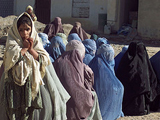Intel Brief: Blow to women's rights
By Diane Chido for ISN
Taliban spokesman, Yousuf Ahmadi, said in a statement on 29 September: "We killed Malalai Kakar. She was our target, and we successfully eliminated our target."
Lieutenant Colonel Malalai Kakar was head of the Khandahar Department for Crimes Against Women. She had been a police woman in Afghanistan since 1982 and had to leave her job and seek exile in Pakistan in 1994 when the Taliban prohibited women from holding most jobs.
After the Taliban's hold was initially crushed by US air strikes in 2002, Detective Kakar went right back to work.
Kakar was from a family of police officers and despite repeated death threats and several unsuccessful assassination attempts, she served her community and her country until she was assassinated on 28 September while leaving her home on her way to work. She was shot in the head in her driveway. Her 15-year-old son was driving the car and remains in critical condition after awakening from a coma some days after the attack.
Detective Kakar was well aware of the danger as the death threats increased, having made international news headlines in November 2003 for thwarting an assassination attempt and killing three of the attackers in a shoot-out. Kakar noted at the time, however, that her work typically involved theft, fights and violence against women, including murders. "If it's a female that commits a crime, then I'm the one who will investigate her. If she's been hurt, it'll be me who takes her to the hospital."
Opportunities for women to obtain education, health care and employment have increased drastically since the Karzai government was installed, and the new constitution reserves 25 percent of the Upper House seats for women, but the method of their election has become its own controversy.
According to the US State Department, the US has implemented over 175 projects directly in support of Afghan women, including women's empowerment, maternal and child health and nutrition, funding the Ministry of Women's Affairs and micro-finance projects.
The problem with this positive advancement of women is that they are now increasingly becoming targets of the resurgent Taliban. The head of Kandahar's Women's Affairs Department was killed in 2006. The first assassination of a female Afghan police officer took place in Herat in June 2008. Afghanistan's police force is being recreated with international assistance after it was decimated under the Taliban and now numbers about 80,000 people, including a few hundred women. However, the police are also increasingly targeted, as nearly 750 of them have been killed since March 2008, mainly in insurgency-linked violence.
A July 2008 report from the Council on Foreign Relations notes: "Though the group [Taliban] has been out of power for several years, it remains a cultural force in the region while working to undermine the US-backed central government. Clashes between Taliban and coalition forces have increased in the first half of 2008, highlighting the Taliban's resurgence and complicating efforts by NATO and US forces to stabilize the country. The Pakistani army, meanwhile, is tackling its own Taliban insurgency."
In the north and parts of Afghanistan's South Waziristan province, Baitullah Mehsud runs a parallel government following a strict Islamic code, which bans music and videos, while his private army claims that people approach them for settlement of their disputes. In a January 2007 interview, Baitullah stated: "We will continue our struggle until foreign troops are thrown out. Then we will attack them in the US and Britain until they either accept Islam or agree to pay jazia (a tax in Islam for non-Muslims living in an Islamic state)."
A United Nations report released in September 2008 states that August had the highest number of deaths since the overthrow of the Taliban, and that from January to August 2008, 1,445 civilians were killed - a rise of 39 percent over the same period last year. The report further states that 55 percent of 2008 civilian deaths can be attributed to the Taliban, double the number for which they were held responsible last year
Kakar was quoted in a November 2004 BBC article noting that, despite the danger, her example had inspired other women recruits to the police force in Khandahar, and at the time of her death, she led a team of 10 women officers, but she warned them all to expect the difficulties she faced every day.
Initially, she returned to work wearing a burqua. She found this made her job easier in some ways, as it often helped her to persuade the recalcitrant to open their doors. "In Kandahar province, women, men and children all love me," she noted, "They contact me by phone and tell me how happy they are with me."
Sadly, this statement proved dangerously wrong in the end; clearly not all loved this courageous and dedicated woman.

